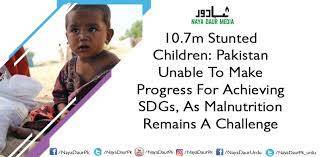
Stunting has reached an alarming level on a national and global scale, with four in every ten children under five years of age stunted in our own country, Pakistan. According to the 2018 National Nutrition Survey, 40.2% of children are stunted, with Sindh, Baluchistan, KPK and Gilgit having the highest rates. A national survey conducted in 2018 revealed a much higher ratio; imagine where the graph would have reached after the recent cataclysmic floods in Pakistan!
Although stunted growth is often associated with a poor diet, the reasons behind that are far more. Stunting is caused by the lack of exclusive breastfeeding and insufficient complementary feeding after six months of birth.
According to the World Health Organization, a child should be breastfed or given formula milk for the first six months and then gradually introduced to solid foods or semi-solid soft foods in addition to milk feed. Stunting has an impact on the child's cognitive and mental development as well as their physical growth. The lack of education of a mother and other cultural, social, and peer pressures, expose her child to the possibility of stunting and other aspects of malnutrition in the future.
It does not stop there; unhealthy childcare practices combined with poor sanitation have also demonstrated the far more damaging impact of environmental enteropathy (EE), a process in which faecal pathogens such as E. coli can permanently damage the intestinal villi of young children, making it difficult for them to absorb nutrients even when there is no sign of diarrhoea.
Poor childcare and sanitation conditions are some of the reasons why we fail to bring the upward trends of malnutrition to low levels. An unclean environment and unsafe drinking water can be the leading causes of stunting.
Stunting has no cure. More distressing is the lack of systematic and efficient water and soil tests, particularly in Sindh and Baluchistan, where the situation is deteriorating. Can we achieve the goal of reducing or bringing the graph below for stunting in children under five? Is it too hard to expect these children to have the right to safe and clean drinking water?
There is desperate need to raise awareness and the government and the respective authorities should launch a national education campaign especially in underprivileged areas. People living below the poverty line need nutritious meals to keep health levels where they can earn. Mothers should be educated about their responsibility and the risks of malnutrition in their children after birth. Last but not least, the establishment of a proper water sanitation system and an efficient testing service will forever remain a dream for Pakistanis.

